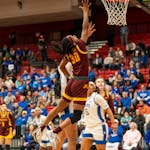When Rashod Bateman told his Gophers teammates he was coming back to campus in hopes of playing this season, they thought he was joking.
"I didn't think it was a possibility," running back Mohamed Ibrahim said in a Tuesday video news conference. "… So just understanding that he can come back, that was a big boost to the whole team."
Can, but not necessarily will, as Bateman's second go at a collegiate career is still foggy.
Much like the Big Ten Conference as a whole, Bateman changed his mind. The reigning Big Ten Receiver of the Year opted out of the 2020 season on Aug. 4, citing health concerns for playing during the coronavirus pandemic.
The conference later canceled all fall sports Aug. 11 but then reversed that decision last week, setting up a delayed fall season to start Oct. 24.
New safety measures, including daily testing, influenced Bateman to decide to play instead of focusing on the 2021 NFL draft, where he is a projected first-round pick. But his path back to college football isn't as simple as just returning to the team.
Bateman is one of several players across the country in the NCAA's Student-Athlete Reinstatement process to regain his remaining two years of eligibility. When he signed with an agent and accepted benefits — including money for housing, transportation and training the past six weeks — that terminated his amateur status, unless the NCAA grants him a special waiver.
"There's going to be a lot of other things we have to do moving forward for him to be cleared, and that's down the road a little bit," Gophers coach P.J. Fleck said. "But he's doing everything he can to handle today, and that's all we told him to focus on. Just focus on today, continue to get better. And a lot of this is out of your control. But again, we know the right measures are being taken, that's for sure."
Bateman did receive permission to practice with the team while the NCAA decides his fate, which he has been doing since Friday. Fleck said Bateman's reintroduction to the team was only welcoming as none of his teammates felt "abandoned" and instead understood why he initially opted out.
Bateman caught 60 passes for 1,219 yards and 11 touchdowns last season as a sophomore, helping the Gophers to an 11-2 season. His return, along with quarterback Tanner Morgan's, would establish the Gophers as legitimate Big Ten West contenders.
Morgan said it's been fun to throw to Bateman again.
"He's come to work every single day ready to get better, ready to be locked in and be a good leader," Morgan said. "… It's great to have him back in the locker room, see his face, see him smiling."
Ibrahim added even with Bateman opted out, the receiver was never really gone from the team, still hanging out with his teammates. And that's probably why his comeback has felt so natural.
"He's an exceptional talent on the field, off the field. … It's not like he ever lost that," Fleck said. "Now he came back the first day, took some reps, and … it's one of those things that you get really excited about. But you also know that a lot of the decisions to come are out of our hands."
Last week, when Fleck first heard the season was a go, his first call went to Bateman, not to pressure him, but to present him with the option to play for the Gophers.
He promised to help Bateman navigate the reinstatement process, feeling like the player had a chance because he opted out for the right reasons — concern for his health — and is only comfortable now because of the Big Ten's new safety protocols.
But he also told Bateman it might not work out.
"If you decide to come back, it is not guaranteed that you're going to come back. You might go through the next four or five weeks, and you might not be allowed to play. Is it worth it to you?" Fleck recalled asking Bateman. "And without hesitation, he said, 'It's worth it. I really want to come back.' "





